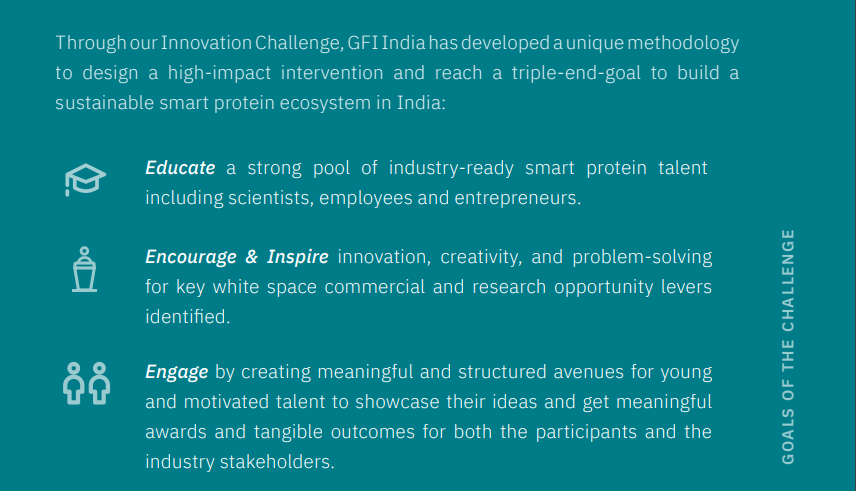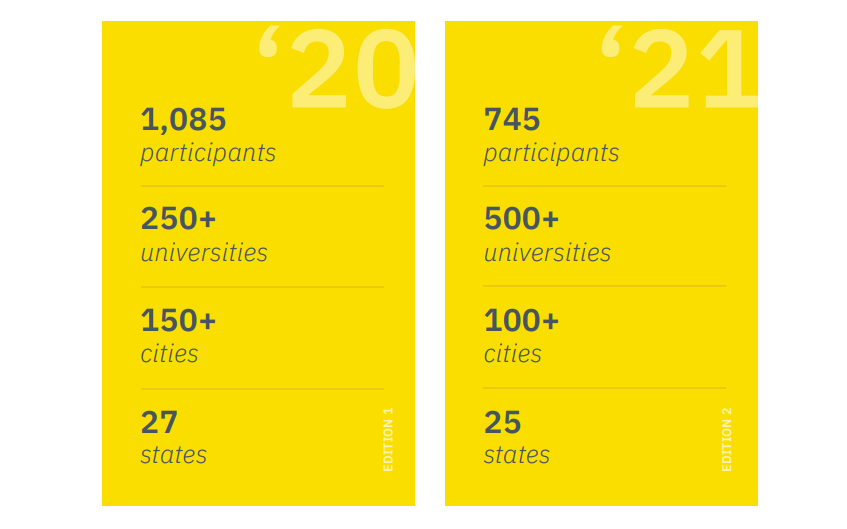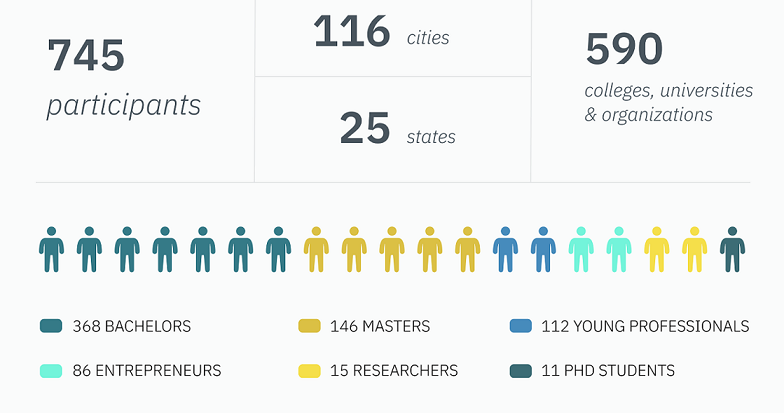The India Smart Protein Innovation Challenge: Transforming the future of food and training the next generation of innovators

Across the global food system, we’re seeing a revolution. Smart protein – alternatives to animal-derived meat, eggs, dairy, and seafood – is poised to transform our food system to make it sustainable, secure, and just.
Globally, we’ve seen around 1,000+ businesses and startups actively leveraging the power of food technology and markets to serve up delicious, nutritious plant-based, cultivated, and fermentation-derived smart protein foods to consumers across the world. This includes top 100 FMCG and retail leaders like Nestlé, Unilever, DuPont, Cargill, ADM, McDonald’s, KFC, Starbucks, and others. Even IKEA, known for its delicious meatballs, recently recreated these iconic meatballs, but without the meat!
In India, there are now more than 50 smart protein startups active within the sector. There’s no doubt that 2021 was smart protein’s breakout year, and today, homegrown Indian startups are serving up plant-based biryanis, kebabs, keema, momos, and more. If we include plant-based dairy alternatives, traditional Indian sweets, dahi, flavored yogurts, coffee, tea, creamers, mayo, cheeses, and egg alternatives like anda bhurji and omelets to our count, in addition to including ingredients, flavorings, and other manufacturers across the value chain, the number of businesses actively working on smart protein has risen to almost a 100. And there are 200+ smart protein products available in the Indian market at this point.
But we still have a long way to go.
Investment in the Indian ecosystem was just a fraction of the global sum – a record-breaking USD 5 billion of which only USD 10.34 million trickled into India in 2021. As a result, there’s still a long way to go in terms of product development, achieving price parity, scaling up manufacturing, and improving other factors for Indian startups to be able to compete with conventional meat, eggs, dairy, and seafood.
That’s where the India Smart Protein Innovation Challenge (ISPIC) comes in.
I first wrote a blog about ISPIC, its agenda, and its impact roughly 2 years ago titled ‘The India Smart Protein Innovation Challenge: Unlocking talent bottlenecks’. It’s absolutely worth noting that before ISPIC and GFI India, there were just 2 companies in 2018 and probably a handful of students, researchers and scientists working on smart protein solutions. As I write this update now, having spent nearly 4 years building the smart protein sector from the ground up, the number of people active in the space has multiplied exponentially, but so have the challenges that we need to solve. ISPIC, GFI India’s first-of-its-kind Innovation Challenge, works on training and mentoring young talent to innovate on solutions to these challenges and ideate around key whitespaces within the sector.
As we know, India is a challenging business environment when it comes to starting technology-forward, high-CAPEX manufacturing businesses and especially so when it comes to food technology, biotechnology, and other bio-science led ventures that are needed to create smart protein. Thus, the Challenge is designed to drive high-impact interventions for the smart protein ecosystem in India, and eventually, for the world.

In its second iteration in 2021, the Challenge was divided into two separate tracks – Track 1 (Innovation) and Track 2 (Entrepreneurship) – depending on the maturity of the teams that applied and their proposed solution:
- The Innovation track focused on coming up with creative, theoretical solutions to technologically advanced industry problem statements. This track was designed for students and researchers to apply their educational and vocational skills to help solve technologically advanced scientific problems and come up with innovative theoretical solutions facing Indian food corporations, startups and entrepreneurs.
- The Entrepreneurship track focused on building a potential commercial venture in the smart protein sector, suited for students, professionals, entrepreneurs and startups who are, unfortunately, having to build the entire innovation stack themselves – sourcing, manufacturing, R&D, innovation, and distribution – due to the lack of a support ecosystem.
ISPIC has been a phenomenal success so far in its two editions in 2020 and 2021:

And here are some of the highlights from the 2021 Challenge:
- We had a prestigious group of sponsors and partners that enabled post-ISPIC support along with aspects of programmatic support during the event.
- Our cohort composition was very diverse with:

- We had an even-split when it came to our cohort’s gender ratio with 50% female participants, further encouraging women in technology and science in India.
- Our Smart Protein Digital Lab – the world’s first online platform of its kind – had 320 candidates certified and invited to join GFI India’s Talent community (~400 members) to discover career opportunities in the smart protein sector. For reference, online courses have ~5% retention but our digital lab saw 40% retention, even after increasing the rigor significantly from the 2020 edition of ISPIC – a testimony to the 100+ high-quality resources GFI India provided through the course of the program.
- Over 2020 and 2021, ISPIC saw over 30 teams reach the final phase of the Challenge. The winners demonstrated an overall understanding of the sector, technological viability with clear milestones for developing their proof of concept, and the marketability of their proposed solutions. With an extended prize pool of INR 21,00,000 for ISPIC 2021 from INR 5,00,000 from ISPIC 2020, we were able to award 20 winning teams with cash prizes across Track 1 and Track 2, an increase from the previous years’ 4 winners.
Through our Mission for Smart Protein, we’re articulating our vision for the protein supply of the future – one which stewards planetary health, tackles malnutrition, benefits farmers, and creates jobs for millions. And our flagship Innovation Challenge is a key pillar of that mission – helping us build an ecosystem that offers every Indian smart protein products that taste the same or better and cost the same or less than their animal-derived counterparts. We know that this is going to be key to feeding 10 billion people by 2050, nearly a sixth of whom will be Indian.
I want to end by highlighting that you can reach out to the teams from our Innovation Challenge to collaborate with them, hire them, or help bring their ideas to life by funding them! Take a look at Smart Protein Solutions Wall – which showcases ideas from our Challenge finalists here for both ISPIC 2021 & ISPIC 2020. And if you want to watch our finalists pitch their solutions to our panel of judges, watch our Demo Day recordings for Track 1 (Innovation) and Track 2 (Entrepreneurship).
For a more detailed overview of the India Smart Protein Innovation Challenge, read our Impact Report here.
